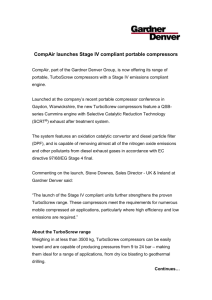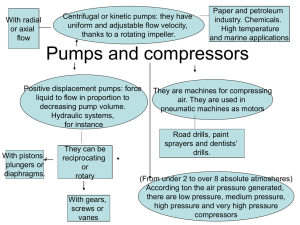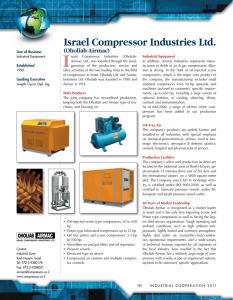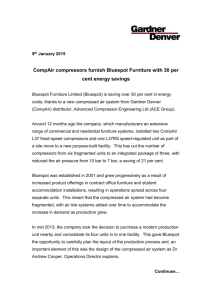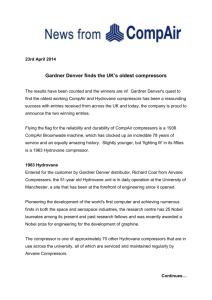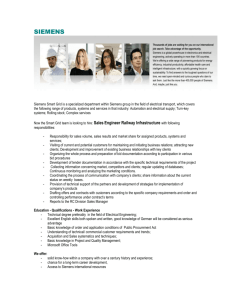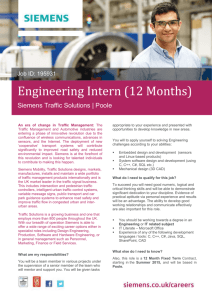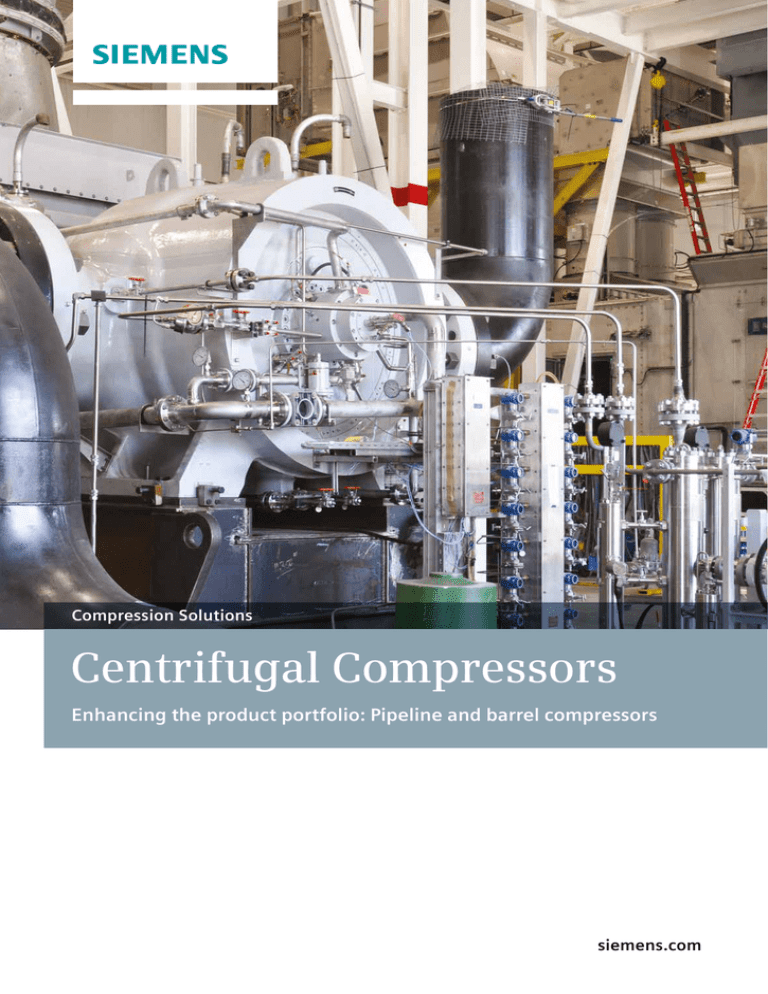
Compression Solutions
Centrifugal Compressors
Enhancing the product portfolio: Pipeline and barrel compressors
siemens.com
2 / Centrifugal Compressors
Pipeline and Barrel Compressors
Efficiency and reliability in natural gas
compression equipment
The RFA36 and RFA24 are among the most efficient
pipeline compressors available today, demonstrating
the performance that is derived in part from a rich
Cooper- Bessemer® heritage. Siemens pipeline and
multi-stage barrel compressors are designed around
API 617 requirements and apply advanced technology
to continue to deliver cost-effective production.
Pipeline Compressors
The RFA36 is the first in a more efficient generation of
industry leading centrifugal compressors. With field–
proven efficiencies of up to 91 percent, the RFA can save
hundreds of thousands of dollars annually in energy costs
compared to conventional pipeline compressors of similar
capacity. This outstanding performance is achieved
through design improvements based on the most recent
advances in fluid dynamics.
Siemens also offers more conventional beam–style
centrifugal pipeline compressors that achieve efficiencies
of up to 90 percent. Engineered for peak aerodynamic
efficiency, Siemens pipeline compressors are installed on
most major natural gas pipeline systems throughout the
world. They perform reliably in a variety of compression
applications in all kinds of climates.
Barrel Compressors
Siemens multi–stage, vertically split centrifugal barrel
compressors are used in natural gas gathering, storage,
gas lift and reinjection service worldwide. Aerodynamic
efficiency, performance flexibility and high reliability are
characteristic of Siemens barrel compressors. Sized to
meet a wide range of flow and pressure requirements in
continuous, full–load operation, they offer high
dependability, even when handling natural gases
containing large amounts of hydrogen sulfide, carbon
dioxide and water.
Over 740 barrel compressors have been built, with more
than 500 units installed in natural gas handling
applications, including over 60 units designed for sour gas
service. In high pressure reinjection, there are standard
Siemens designs up to 4,500 psig (310 barg) maximum
working pressure.
Compressor Packages
Siemens is an experienced packager of complete
compression systems, including modules for offshore
compression. Custom designed units are available for
harsh arctic, offshore and desert environments.
For over 65 years, more than 980 pipeline compressors
have been installed in countries across the globe.
Siemens acquired the Rolls-Royce aero-derivative gas turbine and compressor business effective December 1, 2014. References to Siemens
and products are intended to refer to such business as acquired and incorporated into Siemens as from such effective date.
Centrifugal Compressors / 3
“Engineered for peak
aerodynamic
efficiency, Siemens
pipeline compressors
are installed on most
major natural gas
pipeline systems
throughout the world.”
Pipeline
Compressors
ft-lb/lb kJ/kg
(000) 200
60
180
160
50
140
Head
40
Number of stages
120
100
30
80
20
RFBB20
60
RFBB30
RFBB42
RFBB36
RFA24
40
10
RFA36
20
0
0
0
10
20
0
30
10
40
50
20
60
70
30
80
40
90
100
50
110
60
m3/h
acfm
Inlet Volume Flow (000)
300
Maximum Working Pressure
Barrel
Compressors
RBB
4
250
3
2
RCB
200
150
RDB
100
1
10
REB
50
0
0
0
0
5
10
5
15
30
10
25
15
30
35
40
20
Inlet Volume Flow (000)
45
25
50
30
55
60
35
m3/h
acfm
4 / Centrifugal Compressors
Inlet/discharge
flanges
Casing cover
retained by
segmented
shear rings
High–strength
alloy steel casing
High capacity
thrust bearing
Impeller/gas
passages
Rotor
Tandem dry gas seal
with separation seal
Pipeline compressors
Design advancements have resulted in Siemens
conventional pipeline compressors delivering up to 90
percent efficiencies, while the RFA achieves up to 91
percent. Siemens compressors are designed to API 617
for the widest customer acceptance. State–of–the–art
aerodynamic engineering of the entire gas path
provides peak efficiencies while providing a wide
operating map.
•Series/parallel gas storage units for a Canadian gas
transmission company, each with tandem or triple
pipeline compressors driven by an Industrial RB211 gas
turbine.
Siemens conventional pipeline centrifugal compressors
can accommodate up to five compression stages for
higher head applications.
RFA36 and RFA24
•Six standard frames have flange sizes from 20 to 42
inches (510 to 1,070 mm).
•Design inlet flows range from 1,000 to 62,800 acfm
(1,700 to 106,500 m3/h).
•Pressure capabilities up to 3,220 psig (222 barg).
Power ratings up to 75,000 hp (56,000 kW) at design
speeds from 3,600 to 13,800 rpm.
Applications
Many units are adapted to perform efficiently in a variety
of unique duties not limited to pipeline applications,
including:
•Major oil and gas customer operates a 40 MW
synchronous motordriven RF3BB42 compressor with
variable inlet guide vanes at the output end of their gas
plant in Alberta, Canada to boost pressure up to
pipeline levels.
•4, 10, 18, and 30 MW pipeline compressors in North
American transmission service, driven by variable speed,
synchronous motors.
The RFAs are the most efficient, proven pipeline
compressors in service to date, featuring axial inlet,
tangential discharge and a single–stage, spherically
shaped cast casing.
They are compact, rugged units that weigh only two–
thirds as much as a conventional compressor. The casing
is typically cast from high–strength alloy steel. To
minimize downtime, the aerodynamic and bearing/seal
assemblies are removed toward the coupling end leaving
the main piping undisturbed.
Journal and thrust bearings are of the tilting–pad type.
For highest capacity, the bearings use individually
lubricated pads to reduce bearing temperature and
increase reserve capacity.
Centrifugal Compressors / 5
“Standard casings are
cast to offer generous
flow passages and a
near spherical shape
for compactness, high
strength and top
performance.”
Conventional designs
Siemens conventional beam–style pipeline compressors
offer high head capability through the use of multiple
impellers and minimizes parasitic losses and starting
torque requirements whilst maintaining very high
efficiencies.
fixed– or variable–speed drivers. Special materials are
available for corrosive applications.
Impellers are designed for maximum aerodynamic
efficiency and constructed of high–strength, forged alloy
steel. All impellers are fully shrouded and welded design
or are single piece milled design. Impellers are followed
by a vaned or vaneless diffuser and a carefully–matched
cast volute. On most frame sizes, movable inlet guide
vanes are available for increased flexibility with
Standard casings are cast to offer generous flow passages
and a near spherical shape for compactness, high
strength and top performance. Main flanges are
horizontally opposed to neutralize pipe forces and
movements. Shear ring segments or bolts retain the main
cover. Magnetic bearings are available as an option.
Impellers are tested to 115 percent of maximum design
speed, while casings are hydrostatically tested to 150
percent of design working pressure.
Model
RFBB20
RFA24
RFBB30
RFBB36
RFA36
RFBB42
Maximum working
pressure, psig (barg)
2,000 (140)
2,000 (140)
3,220 (222)
2,250 (155)
1,800 (125)
1,500 (105)
Max flange size,
inches (mm)
20 (510)
24 (610)
30 (760)
36 (910)
36 (910)
42 (1,070)
Number of stages
1–4
1
1–5
1–5
1
1–5
Maximum power,
BHP (kW)
20,000 (14,900)
20,000 (14,900)
75,000 (56,000)
75,000 (56,000)
50,000 (37,300)
75,000 (56,000)
Design speed range, rpm
9,000–13,800
9,000–13,800
3,600–8,000
3,600–6,666
3,600–9,500
3,600–6,666
Impeller diameter,
inches (mm)
10–26 (250–
12–26 (305–
20–35 (508–
660)
660)
889)
24–51
(610–1,295)
24–51
(610–1,295)
24–51
(610–1,295)
Max design inlet flow,
acfm (m3/h)
12,720 (21,600)
25,300 (43,000)
30,800 (52,300)
45,400 (77,100)
60,500
(102,800)
62,800
(106,500)
NOTE: Specifications given in this brochure are subject to change without notice.
6 / Centrifugal Compressors
Shear ring
retained forged
steel casing cover
Inlet
Forged steel casing
with welded–on
nozzles
Diaphragm
Shaft seals,
tandem,dry
gas design
Journal bearing,
tilting–pad type
Discharge
Impellers fabricated
from alloy steel forgings
Rotor
Double–acting, tilting–
pad thrust bearing
Multi–stage barrel compressors
Siemens barrel compressors are available in four frame
sizes with up to nine compression stages. Standard
configurations are available up to 4,500 psig (310
barg) maximum working pressures and up to 35,000
acfm (60,300 m3/h) flows. Power ratings up to 75,000
hp (56,000 kW) at design speeds from 3,500 to
13,800 rpm.
Applications
Siemens centrifugal barrel compressors are found in a
variety of natural gas compression applications.
Installations range from single units to multiple–unit
trains, driven by gas turbines or electric motors. Complete
systems for onshore or offshore service are designed,
manufactured, tested, installed and supported by Siemens
Each compression project is analyzed to select the most
aerodynamically flexible and efficient frame and rotor
combination. For optimum performance and production
economy, each barrel frame size is based on families of
standard stages.
Vaneless or vaned, parallel–walled diffusers are used for
maximum performance. Aerodynamic thrust loads are
compensated by balance drums or center seals. Each rotor
system is custom designed, based on extensive analyses
of lateral and torsional response to maximize
operating reliability.
Casings are forged with welded–on nozzles. For ease of
maintenance, the new configuration joins the end covers,
aerodynamic and rotor assemblies, as well as the bearings
and seals into a single cartridge that can be installed and
withdrawn as one piece. The cartridge is retained in the
casing using segmented shear rings to avoid the need for
hydraulic torquing equipment. It is estimated that a full
cartridge change–out can be accomplished in less than
24 hours.
Shaft seals are available as tandem dry gas type or wet
film bushing seals. The dry gas seal designs include
buffered barrier seals to prevent their contamination
by lube oil.
Journal and thrust bearings, with horizontally split
housings to improve maintainability, are of a tilting–pad
type with renewable pads and collars. All thrust bearings
accept equal thrust loading in either direction and are
self leveling.
Impellers are tested to 115% of maximum design speed,
while casings are hydrostatically tested to 150% of design
max working pressure.
Centrifugal Compressors / 7
“For ease of
maintenance, the new
configuration joins the
end covers,
aerodynamic and rotor
assemblies, as well as
the bearings and seals
into a single cartridge
that can be installed
and withdrawn as
one piece.”
Shear rings removed
Single cartridge design for easier removal
Cartridge removed
Model
RBB
RCB
RDB
REB
Maximum working
pressure, psig (barg)
4,500 (310)
3,220 (222)
2,000 (140)
1,200 (85)
Max flange size,
inches (mm)
16 (405)
20 (508)
24 (610)
30 (762)
Max discharge flange
size, inches (mm)
12 (305)
16 (406)
20 (508)
20 (508)
Number of stages
1–9
1–9
1–9
1–9
Maximum power,
BHP (kW)
35,000 (26,100)
50,000 (37,300)
60,000 (44,700)
75,000 (56,000)
Design speed range,
rpm
8,000–13,800
5,000–11,500
4,500–8,500
3,500–6,500
Impeller diameter,
inches (mm)
12–17 (305–432)
18–22 (458–560)
24–28(610–711)
28–34 (711–863)
Max design inlet flow,
acfm (m3/h)
6,000 (10,200)
13,500 (23,000)
22,000 (37,000)
35,500 (60,300)
NOTE: Specifications given in this brochure are subject to change without notice.
8 / Centrifugal Compressors
String test performed on Industrial RFBB36
Package equipment
Centrifugal compressors engineered to suit gas and steam
turbines, and fixed– or variable–speed electric motors
Siemens works with our customers from project
planning and manufacturing to installation and
service. Our comprehensive compressor systems
include drivers, package components, baseplates,
speed increasers and oil consoles.
Lube and Seal Oil/Seal Gas Systems
Siemens generally provides lube and seal gas systems on
all units. Seal oil instead of dry gas seal systems are also
available. The systems include pumps, motors, coolers,
filters and instrumentation selected to provide and
monitor the required oil flow and pressures. The lube oil
and gas seal systems are in general compliance to
API 614.
Controls
Complete microprocessor–based control systems are
provided for individual units, multiple units and
station control.
Our quality standards are exemplified by our ISO 9001
certification. Factory testing includes a full closed–loop
system simulation that tests the operation of the
hardware and the software for functionality and
dynamic response.
Control systems include:
•Integrated control of gas turbine or motor driven compressor packages
•Complete unit sequencing of the driver, accessories and
compressor
•Complete unit monitoring and protection
•Equipment Health Management
•Compressor surge protection
•Compressor load sharing
•Compressor suction or discharge control
•Data communication
•Interface with DCS systems
•Installation supervision, commissioning and training
Training programs are available that instruct users on the
operation of their control systems and provide insight into
how the controls interact with the mechanical equipment
and process. Control systems are supported by a global
Technical Support and Field Service organization.
Centrifugal Compressors / 9
“Factory testing
includes a full closed–
loop system simulation
that tests the operation
of the hardware and
the software for
functionality and
dynamic response.”
Worldwide manufacturing, testing and sourcing
Centrifugal compressors manufactured by Siemens are
tested and packaged at its Mount Vernon, Ohio facility.
Impellers undergo fabrication and heat treatment to
provide high durability and strength.
All critical components and the assembled unit receive
thorough testing during and after manufacture. Impellers
are balanced, then over–speed tested at 115 percent of
maximum operating speed. Casings are tested for leaks,
strength and design integrity in compliance to API 617.
Aerodynamic performance is proven through open– or
closed–loop testing to confirm achievement of the
contract efficiency, head and flow of the compressor at
specified design and operating points. Full–load and full
pressure Type 1 and Type 2 testing to ASME PTC 10
standards is also available.
The finished unit receives a final mechanical running test
that includes a check of oil flows and vibration levels
throughout the specified speed range. A static gas seal
test confirms that all components will satisfactorily
contain gas at the system’s rated pressure.
10 / Centrifugal Compressors
Typical Head-Flow Performance
Curve for a Pipeline Compressor
140
95% 98%
% of rated head
120
98% of Peak
100
95%
80
60
40
20
40
60
80
1001
20
140
Customer service and
aftermarket support
Capabilities
Re–Aero Services
Our customer service organization is built on the
long–term commitment of Siemens to the successful
operation and maintenance of customer power and
compression equipment. With experienced field
representatives and service centers worldwide, Siemens
provides the technical support for unit commissioning and
operation, as well as repair services, including
contract maintenance.
Siemens compressor components are custom selected /
designed to provide optimum performance at specific
operating and site conditions. Often field conditions
change over time. Even slight process condition changes
may require an existing compressor to operate far enough
from the original design point to warrant a new
compressor aero design or upgraded components. For
example, a small decrease in compressor efficiency can
result in excessive fuel costs. Also, re–aero of an existing
unit offers the opportunity to incorporate the latest aero
design advancements for improved performance and
efficiencies throughout the operating range. Siemens
Customer Service Support staff will expertly evaluate your
current compressor operating conditions and help identify
opportunities to enhance efficiency. With the expertise to
rebuild or replace the compressor aero components to
restore maximum efficiency levels, Siemens can extend
the life of your equipment investment far into the future.
Our genuine OEM replacement parts inventory and special
diagnostic equipment keep our centrifugal compressors
operating at top performance regardless of the
application. An example of Siemens’ commitment to
providing complete life–cycle solutions is compressor
“re–aero” services.
Centrifugal Compressors / 11
“Our genuine OEM
replacement parts
inventory and special
diagnostic equipment
keep our centrifugal
compressors operating
at top performance
regardless of the
application.”
Experience combined with
technology
The advancements of our centrifugal compressors
come from more than 65 years of aerodynamic and
mechanical design derived in part from the rich
heritage of designing, manufacturing and servicing
compressors under the Cooper–Bessemer® brand
name. This legacy is now combined with the expertise
behind one of the world’s most respected names in
engineering: Siemens.
State–of–the–art computer analysis continues to enhance
efficiencies and long–term product integrity:
•Three–dimensional finite element analyses for stress
optimization of casings, impellers, thrust balance drums
and diaphragms.
•Lateral rotor dynamic programs, analyze rotor response
and stability.
•Forced and unforced torsional programs analyze the
complete driver and driven systems.
•Fluid dynamic programs accurately predict compressor
performance under specified operating conditions and
gas mixtures.
•Three–dimensional CAD/CAM systems and CFD analysis
aid the optimization and refinement of compressor
aerodynamic designs while reducing lead times.
Published by and copyright © 2014:
Siemens AG
Power and Gas
Freyeslebenstrasse 1
91058 Erlangen, Germany
For more information, please contact
our Customer Support Center.
Phone: +49 180 524 70 00
Fax: +49 180 524 24 71
(Charges depending on provider)
E–mail: support.energy@siemens.com
Order No. E50001-G420-A365-X-4A00
WS 1114
Printed on elementary chlorine-free
bleached paper.
All rights reserved. Trademarks
mentioned in this document are the
property of Siemens AG, its affiliates, or
their respective owners.
Subject to change without prior notice.
The information in this document
contains general descriptions of the
technical options available, which may
not apply in all cases. The required
technical options should therefore be
specified in the contract.

